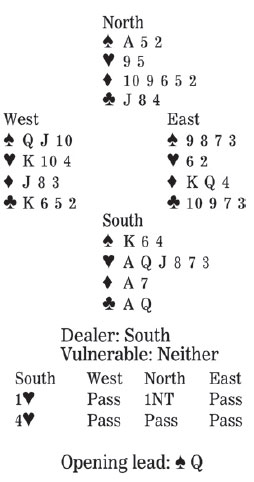Would you count three or four?
By Phillip Alder ( China Daily ) Updated: 2016-01-30 07:24:02
Stirling Moss, an Englishman who won 16 Formula One grand prix races, said, "I was taught that everything is attainable if you are prepared to give up, to sacrifice, to get it."
That can apply at the bridge table. If you sacrifice a trick at the right moment, you will make a contract that would otherwise have failed.
In this deal, which trick should South sacrifice and when? He is in four hearts, and West leads the spade queen.
South had a close decision with his opening bid. He was strong for one heart and a tad weak for two clubs (which would have promised at least nine winners with an unbalanced hand). And here, if he had rebid three no-trump, that would have worked well.
South starts with four possible losers: one in each suit. (If he has two trump losers, he is surely going down.) However, if the club finesse wins, that will probably end all problems. Also, East might have king-doubleton of hearts. But is there any chance if both of those kings are offside?
Now count winners. Declarer has two spades, five hearts, one diamond and two clubs. Hey - that's 10. So, as long as South does not lose four tricks first, he has the winners to get home. He just needs to sacrifice a trick at the right moment.
He must win the first trick in his hand with the spade king. Then he cashes the club ace and continues with the club queen, giving up on the finesse.
Here, West takes the trick and plays another spade. Declarer wins with dummy's ace and discards his low diamond or low spade on the club jack. Then he tries the trump finesse for an overtrick.
|
|
|
|
|
|
|
|

























 Raymond Zhou:
Raymond Zhou: Pauline D Loh:
Pauline D Loh: Hot Pot
Hot Pot Eco China
Eco China China Dream
China Dream China Face
China Face






